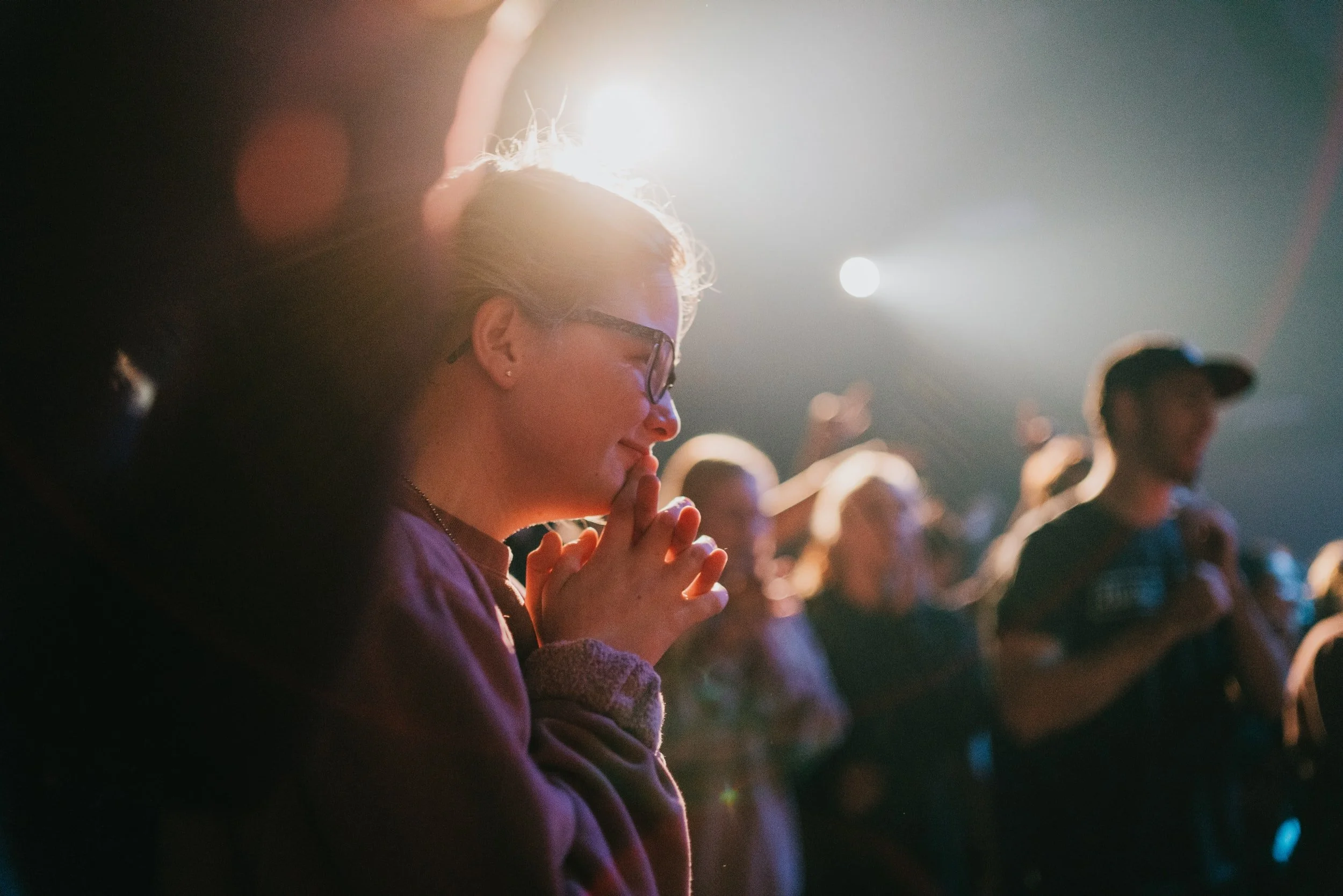Why Pray Out Loud?
There are so many questions that we could ask on the topic of prayer.
How does prayer work?
How should we pray?
Does God hear us?
Will God answer us? How do we know when he has answered?
These are important questions to ask and the Bible should be the source of our answers! But the question I want to spend a moment thinking about is this: Is there any reason we should pray aloud, rather than silently?
Students, staff, and alumni took part in ABHE’s Annual Day of Prayer.
At our college, praying aloud is something we regularly do.
Our worship leaders will pray for the group, but also encourage those in attendance to lift their voices towards God.
Our preachers will invite us to pray for fellow believers and friends next to us. (It’s an excellent balm to hear a friend pray for you!)
We might even break up into small groups to pray over various needs or programs that need our God’s support and vision. And we pray aloud.
Let’s explore some benefits of the practice.
Praying aloud may happen in weekly chapels, prayer nights, or at morning prayer. Feel free!
Praying aloud breaks us out of an individualized faith.
Everyone can feel awkward letting their thoughts be heard by others. As Americans, many of us are used to a very private religion: “I have a personal faith in Jesus and I have a deeply religious private life.” Statements like this reduce our faith in the God of all creation to the private sectors of our inwardness, Having a personal and private faith doesn’t do us any good in fulfilling God’s expectation to be a people (collective) who are a “light to the nations” (Isaiah 42:6; Matthew 5:14-16). God actually wants his communities to be put on public display as God’s one new humanity in Jesus’ name (Deuteronomy 4:5-8; John 17:10-11; Ephesians 2:15).
Praying aloud is also an opportunity to use our voices to encourage one another. Speaking words of faith aloud over another believer is an opportunity to minister to them.
You should be free to talk to God in Christian community.
We have to push against that sense that Jesus isn't part of our “public persona.” It is in the congregation of God’s people that we are freed up from the constraints of ungodly social pressure to speak aloud to our heavenly father and to let our voices be heard among our brothers and sisters. We will be healthier communities and campuses if we learn to hear the voices of our brothers and sisters as our heavenly Father hears them, and our own, with love and grace.
One person or church’s culture or preference does not matter as much as what God’s Word says.
What’s the Bible Say?
More than just our preferences, we should use the great gift God gave us and see what Scripture says about praying out loud.
A Look at the Psalms
The psalm writers are not shy about God hearing their voice.They even expected others to join in! It might be surprising to our ancient ancestors of the faith that we have become so silent in our prayers. Voice is such an integral part of their life with God that they bring it up some 40 times!
Psalm 77:1 says “I cry out with my voice to God; with my voice to God, that he may hear me.” The poet does not feel settled with the silence of meditation and remembering. He begins by stating that it is ‘my voice,’ ‘my voice,’ that God will hear. It is intimate and personal, and it is also out-loud and declaratory!
This same sense for the significance of our voice in prayer is shared in Psalm 142:1 who says “I cry out with my voice to Yahweh; I beg favor with my voice to Yahweh!”
Check out these verses also Psalm 3:4; 5:3; 18:6; 27:7; 64:1; 130:2!
Our need for God’s gracious acts in our lives, relationships, and work are worth our voices being raised and heard. Yes, heard by God, but heard also in the congregation (Psalm 40:9-10)!
At our Bible college, students start every day in prayer. Roommates gather in their living room every morning to pray — an important habit we want all of our future graduates to practice.
Consider our Lord.
We know he was a man of prayer, Yet, we never hear of Jesus praying in his heart, or praying in his mind or thoughts, or even praying quietly. We do have statements about Jesus’ prayer life that might suggest moments where Jesus desired solitude to pray: things like “he went to pray”, or “he went to a deserted place to pray” (Matthew 14:23; Mark 1:35; Luke 6:12; 9:28).
But we surely do moments of Jesus praying out loud. An example is in the Garden of Gethsemane, where being a stone's throw away, he was still heard by Peter, James and John when he prayed, “My father, if it is possible, let this cup pass from me; yet not what I want but what you want” (Matthew 26:36-39). I would imagine that would have been a powerful prayer for Jesus’ students to hear from the voice of their beloved friend and Lord. It impacted the gospel writers enough to be included in the gospels and passed down to us today!
Praying aloud doesn’t mean doing it for show. It’s possible to pray out loud without a motivation to show off to others.
Prayer like Our Father is in the room.
When I asked a few friends about this topic, a couple helpfully pointed out that many might hear Jesus saying just the opposite in Matthew 6:1-15, that Jesus actually prefers we pray alone and in secret. Jesus says this in verse 6, “But when you pray, go into your room and shut the door and pray to your father who is in secret.”
Jesus is saying this to address motives when praying. He is critical of people who pray so “that they may be seen” and who “heap up empty phrases” - like the hypocrites of verse 5 and the Gentiles of verse 7. But in none of these verses does Jesus have anything negative to say about praying aloud. On the contrary, Jesus assumes prayer to be an ‘out loud’ practice both by Jews standing in the synagogues, and the gentiles thinking they are heard for their many words! We can’t lose praying aloud and in the congregation, as we looked at above, just because some “put on a play” (the meaning of “hypocrite”) by praying for human attention. Rather than this, Jesus says we should pray like we’re in the same room as our Father - “go in your room and shut the door and pray to your father”; and that we should pray like the Father knows our secrets - “pray to your father who is in secret” (verse 6). Think about it, there is always less space to get away with pretending something when your mom and dad are in the room -- prayers like that to our father in heaven are what Jesus is getting at. The motive of prayer, not the volume of prayer, is Jesus’ emphasis in this passage.
God hears our prayers whether we say it aloud or not. But the practice of saying words aloud to our Father who hears seems to aid in the intimacy we feel.
God wants the conversation.
We pray aloud because God gave us voices to use, and again and again the Scriptures tell us that our God hears (Exodus 2:24; 1 Samuel 22:7; Psalm 84:8; Micah 7:7). It’s possible we might be missing something in our prayer lives when we belittle the power of speaking aloud to our heavenly father. There is no rule on this, biblically speaking. God ‘knows our hearts’, and as Jesus says before he teaches us his prayer, ‘your Father knows what you need’. And yet, parents know what their kids need, and it doesn’t mean they don’t enjoy hearing them. He knows us, even when our words aren’t perfect, but he wants the conversation! Even the prayers of the psalms were prayers ‘written’ for our hearing.
We were created to be heard, both by our Father in heaven and our brothers and sisters on earth. So, receive the invitation to pray aloud as an invitation to be heard. And from the Father you will receive your answer, and from your brothers and sisters you will receive an amen.








